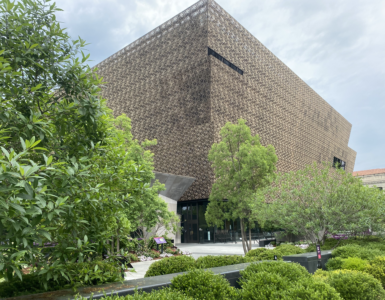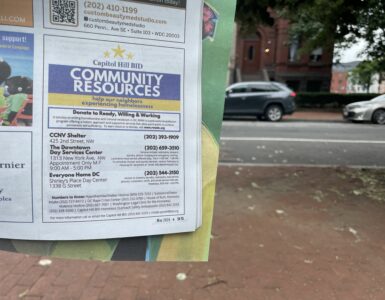School bonds have long been a footnote in Fairfax County politics, appearing on the ballot every two years but drawing little attention. This year, however, shifts in the financial environment and local politics have lent new salience to the often-overlooked school funding question.
“Back when interest rates were close to zero, I voted yes on those,” said John Graves, a McLean resident, who was voting at McLean’s Governmental Center on Saturday—the last day of early in-posting voting in the county. “Interest rates are so high right now,” he continued, adding that he was skeptical that the county should be adding to its debt burden.
Fairfax County Public Schools’ standard operational costs come from the County Executive’s Budget. But to finance building and renovation projects, which require large one-off expenditures, the school district issues bonds to spread the costs out over several years. For this, they need voters’ approval. This year, $435 million in school bonds are on the ballot, with revenues tipped to fund development projects at 15 elementary schools and one middle school, according to the county.
These bond issuances typically pass with overwhelming public support. In 2021, almost 70% of voters voted to approve $360 million in new school bonds. In 2019, school bonds passed with 77% support. In 2023, however, Republicans have been campaigning against the initiative.
“Their use of bonds is, at best, inappropriate,” said Arthur Purves, the Republican candidate for chairman of the Fairfax County Board of Supervisors. Purves cites research from the Fairfax County Taxpayers Alliance, which he has been president of for more than 25 years, showing that since 2016, the cost of servicing existing debts has exceeded revenue from bond sales.
“That’s like opening a new credit card to pay off a previous credit card, and meanwhile, you’re paying interest, which could either be used to lower taxes or to do more construction.”

Purves is also concerned about the misuse of funding from previous bond sales.
“They’re not frugal, I think, in their design of buildings,” Purves said, citing the construction of the new Public Safety Headquarters near Fair Oaks, mainly funded through bonds. “With all the vacant office space in Fairfax County, why couldn’t they repurpose an existing building for their public safety?” Purves added. The retired computer programmer is running against the Democratic incumbent, Jeff McKay.
Local Republican opposition to the new school bonds broke with recent elections when the party took a softer stance. Local politics is partly to blame. Before 2019, Elizabeth Schultz and Thomas Wilson, two Republican-endorsed candidates, sat on the school board. But Democrats now control all the seats.
Purves said Schultz had pushed the Fairfax County Republican committee not to oppose school bonds “because that would make it harder for a school board member to get reelected.”
Both sides have published campaign literature arguing their respective cases before Tuesday’s election. In September, Fairfax Republicans published a blog post from Purves titled “Reasons to Oppose the Fairfax 2023 $435M School Bond Referendum,” where he assails “excessive spending” and fiscal irresponsibility. Meanwhile, Fairfax County Public Schools distributed fliers to parents last month supporting the bond referendum, drawing criticism from some parents over using student data for political campaigning.
Fairfax County Public Schools declined an interview request for this story.
This political sparring, however, may have been lost on voters.
Joaquin Perez, a school social worker, said he hadn’t heard from anybody telling him how to vote on the issue and didn’t know what school development projects stood to benefit from the bond issuance. He voted in favor of the ballot initiative in McLean on Saturday.
“Appropriate funding for schools is important to me,” he said.

Even voters who expressed concern over worsening borrowing conditions revealed they had still voted ‘yes’ on the ballot initiative.
Amy Hammer, a Republican who is voting for Independent or Democratic candidates “until we get Trump and the crazies out of the party,” said she had backed the new bonds, even if it meant higher taxes in the future to fund the debt.
“I have a granddaughter that’ll probably be going through these schools and I had four kids go through these schools,” Hammer said.
“It’s a bad environment,” said Colin Hart, whose children are now university-aged. “But I don’t think we have much choice.”















History can repeat itself.
Excerpt from 1977 Wash Post article:
Through the 1960s, Fairfax voters were strong supporters of bond issues for school building. But the 1970s have been a time of recession, higher taxes and assessments on homes, and, more subjective but no less important, a perception by many voters that public spending, including for schools, was edging toward extravagance. At the same time the percentage of voters who have school-age children has been gradually declining as the median age in the county goes up.
Bolstering the anti-spending attitude has been the well-publicized phenomenon of an overall decline in the county’s student population. According to the most recent projection, given last week by Davis, the population decline between 1976 and 1981 will be from 134,613 students to 125,957.
Dramatizing the decline has been the closing of some schools and plans to shut down considerably more – all in older sections of the county.
If the number of students is going down, if some schools are actually being closed, the spending critics say, why does the system have to construct expensive new facilities? Some of the critics suggest school districts be radically realigned and busing be extended to keep schools of now-declining enrollments open.
The school officials’ answer is that even though overall school population is going down, it is going up in rapidly developing sections in the northern and western parts of the county – the Herndon-Reston and the Burke areas most predominantly. School officials also say there are limitations on the amount of time students can spend riding to and from school in buses.
School officials say they have been able to hold down the extent of new buildings at schools experiencing temporary surges in enrollment. The newest temporary buildings – called “relocatables” – look like and cost almost as much as permanent buildings. But officials say that because the relocatables can be disassembled and moved to other sites to meet new enrollment trends, the structures more than pay for themselves.
County real estate taxes have increased significantly. Federal tax code change penalize Virginia residents. Inflation up. No 1970s recession yet, but at some point older residents either move out of the County and or State, or they say No.